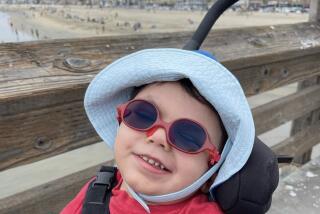Corneas Taken From Body Against Father’s Wishes, Lawyer Says
- Share via
The lawyer for the father of a teenage suicide victim urged a Los Angeles Superior Court jury to award $1 million in damages because the county coroner’s office and a private tissue bank took the dead boy’s corneas despite his father’s objection.
Attorney Joel Warren told jurors in closing arguments Tuesday that the coroner’s office and the Doheny Eye & Tissue Transplant Bank were “driven by the almighty dollar” to take corneas from the dead without asking permission from relatives.
His comments drew sharp protests from Robert L. Dickson, who represents the county and eye bank. “There’s no liability here. The county followed the law. Doheny followed the law,” he told jurors. He added that his clients had done nothing immoral or unethical. Their motives were humanitarian--to restore sight to the living, he said.
Richard Baltierra Jr.’s corneas--thin layers of tissue that fit like contact lenses over the eyes--were “harvested” from the 17-year-old’s body just hours after he shot himself to death July 22, 1996. According to testimony, they gave sight to two women in New Jersey.
His father, Richard Sr., is suing the eye bank and the county for negligence and infliction of emotional distress.
He says he objected to any tissue removal or organ donation. The county and the tissue bank say he didn’t.
“Did Mr. Baltierra object? I’ll submit that he did not,” Dickson said, listing half a dozen coroner’s and eye bank officials, none of whom recalled hearing any protests before the boy’s corneas were removed.
The case went to the jury late Tuesday. Deliberations begin in earnest this morning in the first of what could be many lawsuits over a controversial practice brought to public attention late last year by The Times.
The policy at the center of the suit has since been changed, and relatives’ permission is now required. That change initially brought about a 70% drop in corneal donations, officials said.
Attorney Warren recommended that the eye bank pay $750,000 of the $1 million he seeks for Baltierra, an auto parts store manager from Valinda, an unincorporated community in the east San Gabriel Valley.
On the night of the suicide, Baltierra pleaded with coroner’s investigators “not to put his son in a body bag or to cut him up like a piece of meat or take anything from him,” Warren told jurors during an emotional closing argument.
But, in 1996, Warren said, the father’s pleas that his son’s body remain intact either were not heard or were ignored. He suggested that no one wanted to hear them. The county and eye bank, he argued, had devised a policy of “don’t ask and don’t tell” under a state law they interpreted as giving them the right to take the corneas without consent.
According to testimony during the weeklong trial, coroner’s officials left it to the eye bank to obtain consent. A senior pathologist, Eugene Carpenter, testified that his office considered next of kin incapable of making informed decisions because grief left them “temporarily insane.”
The eye bank, however, viewed family consent as just one means to obtain corneas. The other was legislative, according to testimony by Dr. Ronald E. Smith, Doheny’s medical director. The “legislative consent,” he testified, comes from a section of state law, known as the Coroner’s Law, stating that corneas may be taken if there are “no known” family objections.
“This is really a convenient little scheme they have here in the name of charity,” attorney Warren said. “This is everybody pointing at everybody else and saying, “Don’t ask and don’t tell.’ ”
Doheny, Warren said, called the shots in the coroner’s office, which received $215 for every pair of corneas donated--about 900 to 1,200 corneas each year. The eye bank then sold the corneas to larger tissue banks for $1,700 apiece.
More to Read
Sign up for Essential California
The most important California stories and recommendations in your inbox every morning.
You may occasionally receive promotional content from the Los Angeles Times.










